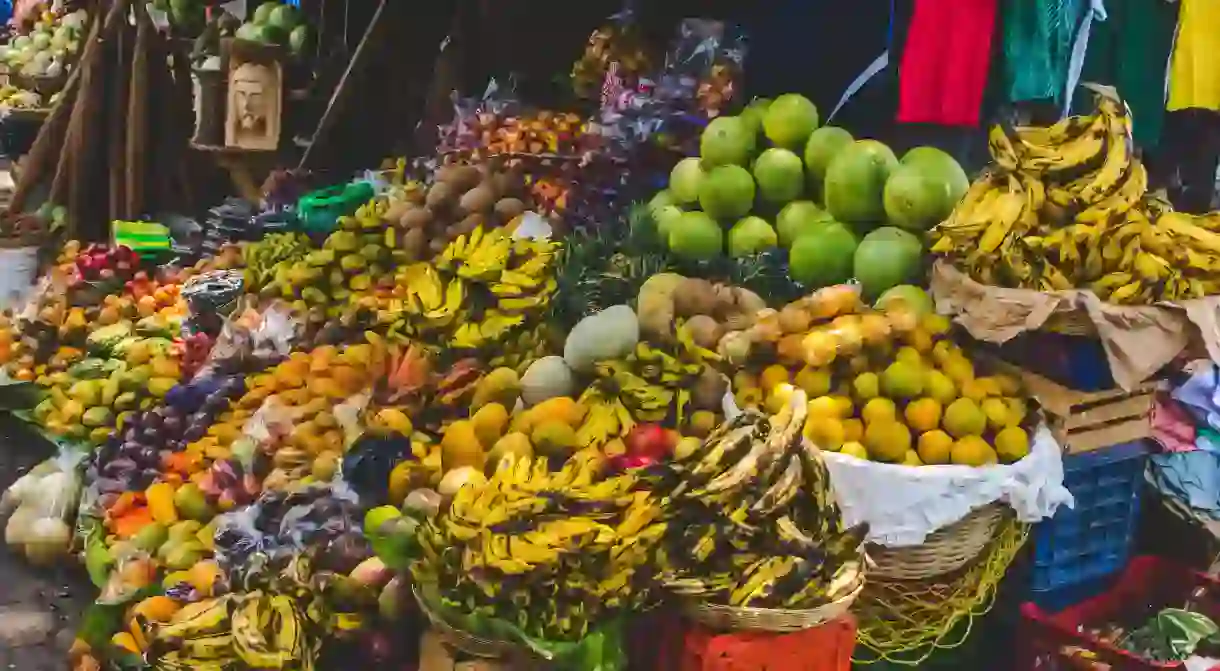The Best Markets in Lusaka, Zambia

Lusaka, the capital city of Zambia is one of the fastest growing cities in Southern Africa, with new malls featuring global chain stores opening regularly. However, as a traveler looking to see a more authentic side of the city, visiting a vibrant market is a must-do. Here is our guide to the best markets in Lusaka, which stock everything from fresh vegetables to souvenirs.
Comesa market
A ‘chitenge’ (a colorful-print wraparound cotton fabric) is an important part of a Zambian woman’s wardrobe, as it is used to make outfits for special occasions, as a wrap to carry babies, worn as a skirt to funerals and other occasions. It also makes a great souvenir for travelers. The Comesa market, located in the Central Business District referred locally as ‘town’, is the best market to find a variety of styles, colors and prints of chitenge.

City market
City market on Lumumba Road has independent sellers stocking items ranging from motor vehicle parts to fresh vegetables, and is the most popular place to buy second-hand clothing called ‘saluala’ which translates to ‘pick’. As with other markets, expect to haggle for a fair price. City market can become quite crowded and during the rainy season (October–April), and the market can get waterlogged, so appropriate shoes should be worn.

Kabwata Cultural Village
Located in the residential area of Kabwata, the Kabwata Cultural Village is a market where souvenirs like wooden key chains, copper items, pottery and more can be purchased from local craftsmen. Unlike Comesa and Soweto markets, Kabwata Cultural Village is smaller and much less overwhelming. As with all markets, haggling is key to getting a good deal. If visiting the market on a Saturday afternoon, enjoy traditional dances from a local dance troupe between 1–4 p.m. The Kabwata Cultural Village is open from Monday to Sunday from 8 a.m. to 5 p.m. and is free to enter.

Dutch market
The Dutch market is a monthly event held in the suburb of Kabulonga’s Dutch Reformed Church, hence its name. Businesses rent stands, which means that one may not find the same items on sale every month. Plants, food, jewelry, curios and more can be purchased and there is usually a bouncy castle for children. There is also a food section. The Dutch market is very popular among the expat population and is held every last Saturday of the month. An entrance fee of less than a dollar is usually charged.
Pakati market
The Pakati market is a curio and souvenir market located in the parking lot of the Arcades shopping mall on Great East Road, Lusaka. Items on sale include chitenge clothing, handbags, second-hand books, copper items and emerald. The sellers target tourists and can inflate the prices, so negotiating is key. The Pakati market is open on Saturday and Sunday and on public holidays from 8 a.m. to 6 p.m.

Burma Road Tuesday market
One of the best places to buy fresh vegetables in Lusaka are at the various Tuesday markets at shopping malls like Crossroads. However, the biggest and most well-known vegetable market is the Tuesday market on Burma Road in the Kabwata residential area. Vegetables such as eggplant, tomatoes, tofu and fish like can be purchased at a much cheaper price than the chain stores.
JCS Food market
The JCS Food market is an Asian-owned market specializing in local and Asian produce. Located in the Long Acres area, the market has independent sellers. Items such as Chinese noodles, oyster mushrooms and more can be purchased from JCS. There is also a section featuring clothing, primarily made of chitenge. There is also an outdoor canteen serving Asian meals.

New Soweto market
The New Soweto market on Lumumba Road is filled with numerous independent vendors selling everything from fresh vegetables, dried food such as ifinkubala (caterpillars), kapenta (tiny fish) and other traditional Zambian foods in bulk. Not all sellers will display the price of items, so negotiation/haggling is encouraged. The market can be overwhelming to navigate at first, so don’t be afraid to ask a local for directions if you get lost. In the rainy season, the market can get waterlogged, so good wellington boots are recommended.













